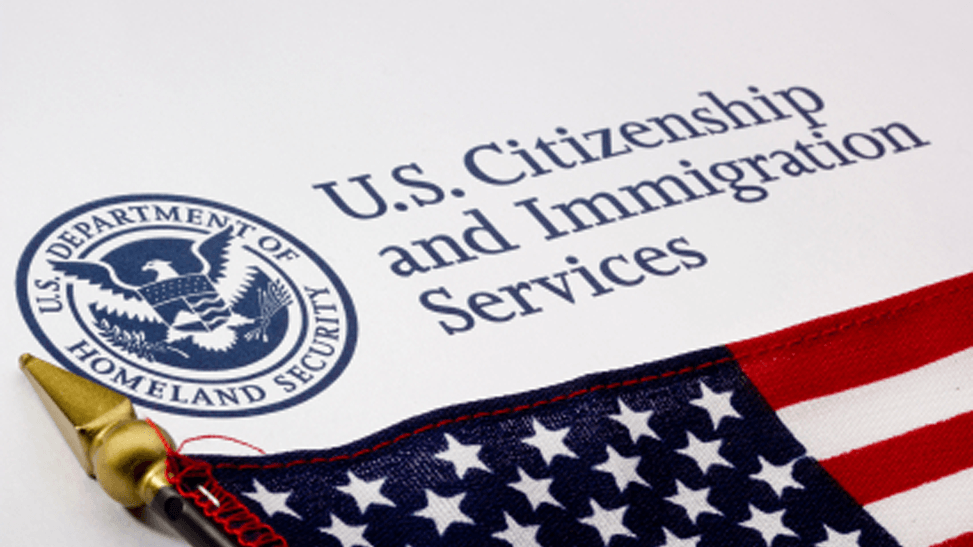Angelica Rice, Esq.

Angelica Rice, Esq.
Email: arice@santoslloydlaw.com

When applying for a green card or seeking admission into the United States, one of the legal hurdles many applicants may face is the public charge ground of inadmissibility. This test evaluates whether someone is likely to become primarily dependent on the government for support. But what exactly does that mean—and what types of public benefits can trigger this issue? In this article, we’ll break down what “public charge” really means, who is affected, what types of public benefits are considered, and what immigrants should be mindful of when making decisions about public programs like Medi-Cal and Medicaid. What Is the Public Charge Ground of Inadmissibility? The public charge rule applies to individuals applying for a visa, green card (adjustment of status), or entry into the U.S., unless they fall into an exempt category. Under this rule, the Department of Homeland Security (DHS) must determine whether the applicant is likely to become primarily dependent on the government for subsistence. This typically refers to receiving: Public cash assistance for income maintenance (such as SSI or TANF), or Long-term institutional care at government expense. This determination is based on the "totality of circumstances," including age, health, financial resources, education, skills, and whether a sponsor has submitted a valid Affidavit of Support. Who Is Exempt from the Public Charge Rule? Many categories of immigrants are exempt from the public charge ground of inadmissibility. These include: Asylees and refugees Special immigrant juveniles Violence Against Women Act (VAWA) self-petitioners T and U visa applicants Temporary Protected Status (TPS) applicants Importantly, even if someone later adjusts status through a different pathway that is subject to public charge, any benefits they received while in an exempt category will not be held against them. What Public Benefits Are Not Considered in the Public Charge Test? It is a common and harmful myth that using any public benefit will jeopardize your immigration status. In fact, most non-cash benefits do not count against you in a public charge determination. According to USCIS and DHS guidance, the following types of assistance (current as of July 1, 2025) are not considered: Health-Related Benefits Medi-Cal/Medicaid, except for long-term institutional care Children’s Health Insurance Program (CHIP) Health insurance through the ACA Marketplace, including subsidies COVID-19 testing, vaccines, and treatment Community health services, crisis counseling, and short-term shelters Food and Nutrition SNAP (Food Stamps) WIC School meal programs Food banks and emergency food assistance Housing and Energy Emergency shelter Rental assistance (e.g., McKinney-Vento programs) Energy assistance (e.g., LIHEAP) Education and Childcare Public schooling Head Start Childcare subsidies (e.g., CCDF) Educational grants and scholarships Federal Cash and Tax Benefits Earned income tax credit (EITC) Child Tax Credit (CTC) Stimulus checks Unemployment insurance Social Security and veteran’s benefits Disaster and pandemic-related cash aid In short, just because a benefit is public or government-funded doesn’t automatically make it count against you. A Word of Caution About Medi-Cal and Medicaid, in Particular As of today (07/01/2025), standard use of Medi-Cal (California’s version of Medicaid) or Medicaid for most health-related services is not considered in a public charge determination. This includes preventative care, emergency services, pregnancy-related services, and short-term care. However, if Medicaid is used for long-term institutionalization, such as in a nursing home or psychiatric facility, that does count under the public charge test. Despite current guidance, we are seeing political shifts and changes in tone from the current administration that suggest public charge policies may become more restrictive in the future. This includes renewed interest in expanding the types of public benefits that may be considered, particularly around medical assistance. For that reason, we generally recommend that individuals who are applying for adjustment of status, or who may be subject to the public charge ground in the future, avoid enrolling in Medi-Cal or Medicaid at this time, unless absolutely necessary. Final Thoughts Immigration law is complex, and the rules surrounding public charge can feel confusing or even frightening. But it’s important to understand that using most public benefits—especially for food, education, and healthcare—will not automatically jeopardize your green card or visa application. Still, because policy can change quickly, we urge individuals to consult with an immigration attorney before applying for any public assistance—especially healthcare programs like Medi-Cal or Medicaid. If you have questions or concerns about how public benefits might impact your immigration case, our office is here to help. We are committed to providing up-to-date, personalized guidance to keep your immigration journey on track. Disclaimer The information provided herein is for general informational purposes only and does not constitute legal advice. Every immigration case is unique, and the application of the public charge rule may vary depending on your specific situation. If you believe this topic may apply to you or you need individualized legal guidance, we encourage you to contact one of our highly-qualified legal professionals for a consultation and assistance tailored to your circumstances. Resources: USCIS Public Charge Resources ILRC Medi-Cal and Public Charge Alert (2024) California Medi-Cal Immigrant Eligibility FAQ

On March 31, 2024, U.S. Citizenship and Immigration Services (USCIS) implemented a policy update that limits gender marker selections on all immigration forms and systems to two biological sexes: male and female. This change eliminates the option for applicants to select a non-binary or “X” gender marker—an option that had previously been permitted on some forms. While USCIS emphasizes that this update does not change who qualifies for immigration benefits, it may significantly impact how certain applications—particularly asylum claims based on gender identity-related persecution—are understood and evaluated. What Has Changed? Under the revised policy, applicants may now only choose “Male” or “Female” when completing USCIS forms. The ability to select a non-binary or third-gender option is no longer available. Applicants may still request to change their gender marker with USCIS, but only within the male/female binary. Supporting documentation, such as medical or legal records, is not required to make the change. This means that transgender individuals can still align their gender marker with their identity—if it falls within the two binary categories—but non-binary individuals are no longer represented. The change follows guidance issued by the federal Office of Management and Budget (OMB), which called for greater consistency in the collection of sex and gender data across federal agencies. Impact on Asylum Applicants This policy update is especially important for individuals applying for asylum based on persecution related to their gender identity. Under U.S. immigration law, asylum is available to people who have suffered persecution—or fear future persecution—based on their membership in a “particular social group.” This includes people targeted for being transgender, gender non-conforming, or otherwise not aligning with socially expected gender roles in their home country. Although the legal standard for asylum remains unchanged, the removal of the non-binary gender marker could make it harder for some applicants to clearly present and document their identity. In asylum cases, credibility and clarity are crucial. The ability to accurately reflect one’s gender identity on official forms can play an important role in establishing the foundation of a persecution claim. Now, applicants who identify as non-binary or outside the traditional male/female categories may be forced to select a gender that does not align with their lived experience. This could lead to confusion in their case file or require additional explanation during interviews or hearings. This policy could weaken the strength of some asylum claims—not because the underlying facts have changed, but because the official forms now fail to reflect the applicant’s true identity. For example: A non-binary person applying for asylum after being targeted in their home country may now have to select “Male” or “Female” on their asylum application, despite not identifying as either. This mismatch may lead adjudicators to question the applicant’s identity, possibly weakening the strength of the claim or requiring added clarification and documentation. In defensive asylum cases—where applicants are in removal proceedings—such inconsistencies could create unnecessary hurdles and complicate the evidentiary presentation. What Can Applicants Do? Despite the change, individuals can still pursue asylum based on gender identity. The underlying eligibility criteria remain the same. However, applicants should be prepared to clearly explain any differences between their stated identity and the gender marker required on USCIS forms. Applicants are encouraged to: Include a personal declaration explaining their gender identity in detail and how it relates to their fear of persecution. Provide evidence such as affidavits, country condition reports, or expert testimony that supports the claim. Work with an experienced immigration attorney who can help present the claim effectively and prepare for any questions that might arise from the new form limitations. The new USCIS policy on gender markers may seem like a technical update, but for asylum seekers fleeing gender-based persecution, it has real implications. While individuals are still legally eligible to seek protection, the limitation to binary gender options could make it more difficult to fully and clearly present their case. If you or someone you know is facing immigration challenges related to gender identity—or is concerned about how this policy may impact an asylum claim—please contact Santos Lloyd Law Firm to schedule a consultation with one of our experienced immigration attorneys. We’re here to help ensure your voice is heard and your case is handled with the care and expertise it deserves.

In January 2025, the U.S. government introduced a mandate requiring all individuals without legal status in the country to register with federal authorities. This initiative aims to enhance national security and ensure compliance with existing immigration laws. If you or someone you know is affected by this change, it's essential to understand the specifics of this requirement and how to comply. Who Is Already Registered? Many individuals have already fulfilled their registration obligations through prior interactions with U.S. immigration authorities. You are considered registered if you have been issued any of the following documents: Lawful Permanent Resident Card (Green Card) Form I-94 or I-94W (Arrival/Departure Record), even if the period of admission has expired Immigrant or nonimmigrant visa issued before arrival Employment Authorization Document (EAD) Border Crossing Card Additionally, if you have applied for lawful permanent residence using forms such as I-485, I-687, I-691, I-698, or I-700, even if the applications were denied, or if you were paroled into the U.S. under INA 212(d)(5), you have met the registration requirement. Who Needs to Register Now? If you have not been registered through any of the means mentioned above, you are required to register under the new mandate. This includes: Individuals aged 14 or older who were not registered and fingerprinted when applying for a visa and have remained in the U.S. for 30 days or longer. They must apply before the expiration of those 30 days. Parents or legal guardians of children under 14 who have not been registered and have been in the U.S. for 30 days or longer. They must register their children before the 30-day period ends. Any individual who turns 14 years old in the U.S. and was previously registered. They must apply for re-registration and fingerprinting within 30 days after their 14th birthday. Notably, American Indians born in Canada who entered the U.S. under section 289 of the INA and members of the Texas Band of Kickapoo Indians who entered under the Texas Band of Kickapoo Act are exempt from this requirement. How to Register The U.S. Citizenship and Immigration Services (USCIS) is developing a new form and process for registration. Starting February 25, 2025 , individuals required to register should create a USCIS online account in preparation for the registration process. Once the process is implemented, registrations will be submitted through this online account. Important Considerations Registration Is Not an Immigration Status: Completing the registration does not grant any immigration status, employment authorization, or other rights or benefits under U.S. law. Consequences of Non-Compliance: Failure to comply with the registration requirement may result in fines, imprisonment, or both. At Santos Lloyd Law Firm, P.C., we are committed to guiding you through this process with compassion and expertise. Our trusted immigration lawyers are here to provide the information and assistance you need during this time. For personalized guidance and support, please contact Santos Lloyd Law Firm, P.C., and speak with one of our experienced immigration attorneys. We are dedicated to helping you navigate these changes and securing a hopeful future.
Angelica Rice is well-versed in Immigration Law and has a rare perspective when it comes to handling her cases.
As a former Department of Homeland Security ICE Prosecutor, Angelica has experience with and understands the viewpoint of opposing counsel. She is a seasoned trial attorney, whose main focus is representing clients before USCIS and the Immigration Court.
Angelica’s legal background is exceedingly diverse. Prior to joining Santos Lloyd Law, Angelica was the Director of the Immigration division of a boutique immigration law firm in Miami, Florida, worked as an Associate Attorney for a prominent family law firm, in addition to commanding the courtroom in her prior role as an Assistant Chief Counsel with the Department of Homeland Security ICE office in Los Angeles, California.
The combination of Angelica’s experiences and legal background makes her uniquely qualified to handle any and all immigration matters.
Find out more about Angelica
Areas of Practice
 Button
ButtonImmigration Law:
- Family Based Immigration:
- Adjustment of Status
- Asylum, Naturalization
- I-751 (Removal of Condition)
- I-601 and I-601A Waivers
- I-212, I-589
- USCIS Interviews
- Business Immigration:
- O-1B
- O-1A
- P-1B
- P-3
- EB-2 NIW
- EB-1A
- E-2
- Removal Defense
- Immigration Court process
Education
 Button
Button- J.D., St. Thomas University School of Law, 2016
- Graduated Cum Laude
- Vice President of Competition, Trial
Team, 2015 – 2016- Member of Peter T. Fay Inn of
Courts
- B.A. in Criminology, University of Florida, 2013
- Graduated Cum Laude, 2013
- Member of Trial Team
Languages
 Button
Button- English
Bar Admissions
 Button
Button- Admitted to the Florida Bar
- Licensed to practice law before the United States Immigration Court
Honors & Awards
 Button
Button- Dean’s List, St. Thomas University School of Law, 2014 - 2016
- CALI Book Award, St. Thomas University School of Law, 2016
- Dean’s List, University of Florida, 2012 – 2013
Presentations
 Button
Button- UPCOMING
– “Removal Proceedings before EOIR: Courtroom Procedure and Legal Representation” Orange County Bar Association (OCBA) (July 2025)
- “Work Authorization for Asylum Seekers: Legal Strategies and Best Practices” MyLawCLE (March 2025)
- Multiple videos and Instagram reels regarding hot topics in immigration - Santos Lloyd Law Firm promotion (September 2024 – present)
- “Santos Lloyd Law Firm – Who we are and what we do” Newport Beach Chamber of Commerce (NBCC) (multiple presentations to the NBCC Inspire Referral Roundtable between August 2024 - present)
- "EB-2 NIW Updates: Current Trends and Strategies" Orange County Bar Association (OCBA) (January 2024)
- “How to Use Tech with Non-Tech Savvy Clients” American Immigration Lawyers Association (AILA) (September 2023)




